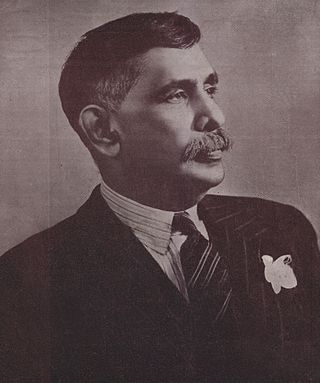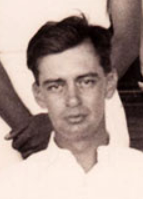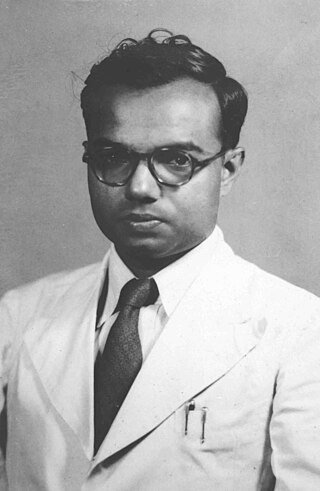Related Research Articles

Don Stephen Senanayake was a Ceylonese statesman. He was the first Prime Minister of Ceylon having emerged as the leader of the Sri Lankan independence movement that led to the establishment of self-rule in Ceylon. He is considered as the "Father of the Nation".

Colonel Frederick Cecil "Derek" de Saram, OBE, ED was a Sri Lankan lawyer, a Ceylon cricket captain, and an officer of the Ceylon Army. He led the attempted military coup of 1962.

Mapatunage James "M. J." Perera was a Sri Lankan civil servant with nine members in his family in Udumulla, Padukka. He created broadcasting history by being the first Ceylonese Director General of Radio Ceylon, the oldest radio station in South Asia, taking over the helm from John Lampson of the BBC.
Hamilton Shirley Amerasinghe, CCS was a Sri Lankan diplomat and civil servant. He was High Commissioner to India and concurrently Ambassador to both Nepal and Afghanistan (1963–1967) and Permanent Secretary of the Ministry of Finance and Treasury and the Ministry of Health. Amerasinghe served as Ceylon's Permanent Representative to the United Nations 1967 to 1980 and served as President of the United Nations General Assembly in 1976. He was also one of the leaders of the negotiations to draft the United Nations Convention on the Law of the Sea.
The 1962 Ceylonese coup d'état attempt was a failed military coup d'état planned in Ceylon. A group of Christian officers in the military and police planned to topple the government of Prime Minister Sirimavo Bandaranaike during the night of 27 January 1962. Organised by Colonel F. C. de Saram, Colonel Maurice De Mel,, Rear Admiral Royce de Mel, C.C. Dissanayake, Sydney de Zoysa and Douglas Liyanage, it was to take place in the night of 27 January 1962, but was called off as the government gained information in the afternoon and initiated arrests of the suspected coup leaders before the coup was carried out.
Cyril Cyrus "Jungle" Dissanayake, MVO was a Sri Lankan senior police officer. He was serving as Deputy Inspector-General of Police of Range I, when he was implicated as one of the leaders of the attempted military coup of 1962.
Sydney Godfrey de Zoysa was a Sri Lankan senior police officer. A former Deputy Inspector General of Police (DIG) of Range II and Permanent Secretary to the Ministry of Internal Security, he was one of co-conspirators of the attempted military coup of 1962.
Major General Deshamanya Alexander Richard Udugama, MBE was a Sri Lankan military leader, politician and diplomat. Former Army Commander (1964–1966), he was elected as Member of Parliament for Matale from 1970 to 1977 and served as Sri Lankan Ambassador to Iraq from 1979 to 1982. He was accused of an alleged coup d'état in 1966.
The 1966 alleged Ceylonese coup d'état attempt was an alleged military coup planned in Sri Lanka (Ceylon). The commander of the army and several military personnel were arrested. They were later acquitted of a plot to overthrow the legally elected government.
Neil Quintus Dias commonly known as N.Q. Dias, was a Sri Lankan civil servant. A career officer of the Ceylon Civil Service, he was the Permanent Secretary of Defence and Foreign Affairs from 1960 to 1965, serving as the de facto Chief Adviser to Prime Minister Sirimavo Bandaranaike and as Ceylon's High Commissioner to India from 1970 to 1972.

Sir Arthur Godwin Ranasinha, CMG, CBE, CCS was a Sri Lankan civil servant and statesmen. A career civil servant in the Ceylon Civil Service, he served as Secretary to the Treasury, Cabinet Secretary and Governor of the Central Bank of Ceylon before apportionment as a Cabinet Minister and Senator. He had also served as Ceylon's Ambassador to Italy.
Justice Thusew Samuel Fernando, CBE, QC was a Sri Lankan lawyer and judge. He was a Puisne Justice of the Supreme Court of Ceylon and Solicitor General of Ceylon.
Major Victor Joseph Harold Gunasekera, CCS was a former Ceylonese civil servant. The former Controller of Imports Exports, Government Agent of Kegalle and Secretary to the Board of Control for Cricket. A reservist, he was a Major in the Ceylon Artillery and was one of the accused of the attempted military coup of 1962.
Deshamanya Justice Victor Tennekoon QC was a Sri Lankan lawyer and jurist. He served as the 35th Chief Justice of Sri Lanka, as well as the 33rd Attorney General and 23rd Solicitor General. From 1979 to 1984 Tennekoon served as Chancellor of the University of Peradeniya.
Deshamanya Abdul Caffoor Mohamed Ameer, QC was Sri Lankan lawyer. He was the 32nd Attorney General of Ceylon. He was appointed in 1966, succeeding Douglas St. Clive Budd Jansze, and held the office until 1970. He was succeeded by Victor Tennekoon.
Rear Admiral Gerard Royce Maxwell De Mel, OBE was a Ceylonese admiral. He was the Captain of the Royal Ceylon Navy from 1955 to 1961, the first Ceylonese to hold the post. He was accused and convicted in the 1962 Ceylonese coup d'état attempt.

S. W. R. D. Bandaranaike, the fourth Prime Minister of Ceylon, was assassinated by the Buddhist priest Talduwe Somarama Thero on September 25, 1959, while meeting the public at his private residence, Tintagel, at Rosmead Place in Colombo. Shot in the chest, abdomen and hand, Bandaranaike died the following day at Merchant's Ward of the Colombo General Hospital. He was the first Sri Lankan national leader to be assassinated, which led to his widow Sirima Ratwatte Dias Bandaranaike becoming the world's first female Prime Minister.
Morawakkorakoralege Walter Fonseka Abeykoon was a Ceylonese civil servant and served as the Inspector General of Police between 1959 and 1963.
Colonel Maurice Ann Gerard de Mel is a Ceylonese army officer. He served as Chief of Staff of the Ceylon Army and Commandant of the Ceylon Volunteer Force. He was one of the principals accused of the 1962 Ceylonese coup d'état attempt.
Merenna Francis de Silva Jayaratne, CCS was a Sri Lankan civil servant and diplomat. He was the Ceylonese Ambassador to the United States, Ceylonese Permanent Representative to the United Nations and Permanent Secretary of the Ministry of Transport and Works.
References
- ↑ The Ceylon Civil List 1954. Ceylon: The Government Press.